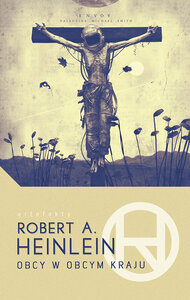Take a photo of a barcode or cover
slow-paced
Plot or Character Driven:
A mix
Strong character development:
Complicated
Loveable characters:
Yes
Diverse cast of characters:
No
Flaws of characters a main focus:
Complicated
I read this in high school (during the time of the Vietnam War protests) so this was particularly poignant to me at that time given my leanings towards "make love, not war".
Valentine, a young man raised on Mars by Martians, isolated from humans, is returned to Earth where he encounters his fellow man for the first time. He's confused - when people laugh it always seems to be at the cost of pain for another. Why humans act as they do is a dilemma to him. He learns to become human while teaching others around him what it means to be truly human.
His innocence is insightful and he comes practiced in the ways of Martians where he's been taught to tap into that other 90% of the human brain that earthlings have yet to manage.
Valentine, a young man raised on Mars by Martians, isolated from humans, is returned to Earth where he encounters his fellow man for the first time. He's confused - when people laugh it always seems to be at the cost of pain for another. Why humans act as they do is a dilemma to him. He learns to become human while teaching others around him what it means to be truly human.
His innocence is insightful and he comes practiced in the ways of Martians where he's been taught to tap into that other 90% of the human brain that earthlings have yet to manage.
adventurous
emotional
medium-paced
Plot or Character Driven:
A mix
Strong character development:
Complicated
Loveable characters:
Complicated
Diverse cast of characters:
No
Flaws of characters a main focus:
Complicated
Rated it high because it was well written. Some things in the book as a reader I wish went a different way.
What a wild ride! I think the first half was more enjoyable than the last half, perhaps I am just a prude. The pace of the dialogue did take some getting used to (it felt very 60s’ that way), and I enjoyed many of the rhetorical arguments. I found myself wishing that a character would show up who could logically steamroll Jubal… who seems a very transparent author stand-in.
Very patronizing views towards women and homophobic comments did take me out of the narrative every time though. Like seriously how many scenes did we get where the women appear just to make cocktails or sandwiches for the men discussing Important Matters?
Very patronizing views towards women and homophobic comments did take me out of the narrative every time though. Like seriously how many scenes did we get where the women appear just to make cocktails or sandwiches for the men discussing Important Matters?
I've read this book before, but I had never gotten farther than half way. It's a very good book, but, not without flaws.
On the surface, it's a classic Heinlein tale: mid-60s types (think Mad Men) deal with Sci-Fi elements. Michael Valentine Smith was born and raised on Mars. Now he's back and he has to get used to being on earth, while earth has to get used to him. He's so odd that it takes 200 pages before you realize his name is something mundane as Mike Smith.
The book is best when it features Jubal Harshaw, the old author that rescues and adopts Mike. Jubal is a typical iconoclast. He has withdrawn from the parts of society he can't stand. He's what I'd be if I had a load of cash.
The book's take on non-monogamy is pretty good, but it's been 50 years, so expect some unconscious anti-feminism and homophobia. RAH's non-monogamy is for men and the women they liberate.
The book is weakest when it gets bogged down in religion. RAH correctly predicts megachurches and their political power, but he spends a too much time showing how Mike gets religion. It's only a little tedious.
All in all, it's a good book, but it takes time to grok it in fullness.
On the surface, it's a classic Heinlein tale: mid-60s types (think Mad Men) deal with Sci-Fi elements. Michael Valentine Smith was born and raised on Mars. Now he's back and he has to get used to being on earth, while earth has to get used to him. He's so odd that it takes 200 pages before you realize his name is something mundane as Mike Smith.
The book is best when it features Jubal Harshaw, the old author that rescues and adopts Mike. Jubal is a typical iconoclast. He has withdrawn from the parts of society he can't stand. He's what I'd be if I had a load of cash.
The book's take on non-monogamy is pretty good, but it's been 50 years, so expect some unconscious anti-feminism and homophobia. RAH's non-monogamy is for men and the women they liberate.
The book is weakest when it gets bogged down in religion. RAH correctly predicts megachurches and their political power, but he spends a too much time showing how Mike gets religion. It's only a little tedious.
All in all, it's a good book, but it takes time to grok it in fullness.
A captivating book. It shows it's age with the negative view on homosexuality, although the author seems otherwise progressive.
It's extremely disappointing that Stranger is considered to be a classic of American literature when half of it reads like a teenager whining about politics/religion on Reddit, the other half reads like incel fan fiction, and both halves are boring. Doesn't hold a candle to Heinlein's prior work.
Heinlein always explores morality, philosophy, religion, and art thoroughly in a very Socratic manner: characters converse about all of the themes in passages that serve to educate the reader. Of course, the characters that do the intellectual heavy-lifting are always male, and the majority of female characters are more two-dimensional and extremely similar, actually, in construct.
I would really like to see commentary on this novel as to why it is considered one of the great sci-fi novels. I am also very interested in Heinlein's personal life. The power of this novel is such that I feel very emotionally appreciative of the characters, yet not truly accepting of its moral propositions. Hence the three star rating.
I would really like to see commentary on this novel as to why it is considered one of the great sci-fi novels. I am also very interested in Heinlein's personal life. The power of this novel is such that I feel very emotionally appreciative of the characters, yet not truly accepting of its moral propositions. Hence the three star rating.
A product of its time, [b:Stranger in a Strange Land|350|Stranger in a Strange Land|Robert A. Heinlein|https://images.gr-assets.com/books/1156897088s/350.jpg|908211], is a deliberately provocative social satire piece that sadly still resonates today despite being written two generations ago. As can be seen by some of the extreme negative reviews on this site (look up satire folks), on the surface the books depicts a ridiculously misogynist society that is both prudishly puritanical and obsessed with sex. Read literally, the book comes across like a lurid misogynist sci-fi fantasy as written by 1960's Playboy magazine. However, [a:Robert A. Heinlein|205|Robert A. Heinlein|https://images.gr-assets.com/authors/1192826560p2/205.jpg] was not advocating any of these ideas, but rather he was satirizing the real society around him that is hypocritically and condescendingly prudish while secretly, or not so secretly, obsessed with sex and money. His goal with the book was to challenge this hypocrisy. Sadly, while somewhat dated, the book still remains relevant today.
In lieu of a review (because what would be the point?), a few notes intead:
(1) I can see why it's considered a science fiction classic. On an intellectual level, I "get" that part. Hence getting shelved as "important". Creating a character and a milieu and a plot to lampoon all of our socio-cultural conventions? Even cannibalism? Brilliant! But that doesn't mean I have to like it.
(2) How did this book get lauded and praised as the "bible" of the counter-culture/sexual revolution? Heinlein's narrative stilts toward homophobic and what was up with the line (from Jill!) re: "nine times out of ten if a woman gets raped, it's her fault"? Terrible.
(3) Just like I couldn't stand what [a:Melville|1624|Herman Melville|http://photo.goodreads.com/authors/1183237249p2/1624.jpg] did with [b:Billy Budd|15613|Billy Budd, Sailor (Enriched Classics)|Herman Melville|http://photo.goodreads.com/books/1166676117s/15613.jpg|2764239], I couldn't stand the "Christ-figure" thing that Heinlein did with M.V.Smith either. I feel like there's this impulse in Western literature to write a Christ-figure into your story. And I think that there's this impulse on the part of critics to just orgasm all over themselves to praise it when an author does it. But this never seems to add anything to the narrative — it always just comes across as heavy-handed and abusive. Stop it.
(1) I can see why it's considered a science fiction classic. On an intellectual level, I "get" that part. Hence getting shelved as "important". Creating a character and a milieu and a plot to lampoon all of our socio-cultural conventions? Even cannibalism? Brilliant! But that doesn't mean I have to like it.
(2) How did this book get lauded and praised as the "bible" of the counter-culture/sexual revolution? Heinlein's narrative stilts toward homophobic and what was up with the line (from Jill!) re: "nine times out of ten if a woman gets raped, it's her fault"? Terrible.
(3) Just like I couldn't stand what [a:Melville|1624|Herman Melville|http://photo.goodreads.com/authors/1183237249p2/1624.jpg] did with [b:Billy Budd|15613|Billy Budd, Sailor (Enriched Classics)|Herman Melville|http://photo.goodreads.com/books/1166676117s/15613.jpg|2764239], I couldn't stand the "Christ-figure" thing that Heinlein did with M.V.Smith either. I feel like there's this impulse in Western literature to write a Christ-figure into your story. And I think that there's this impulse on the part of critics to just orgasm all over themselves to praise it when an author does it. But this never seems to add anything to the narrative — it always just comes across as heavy-handed and abusive. Stop it.







